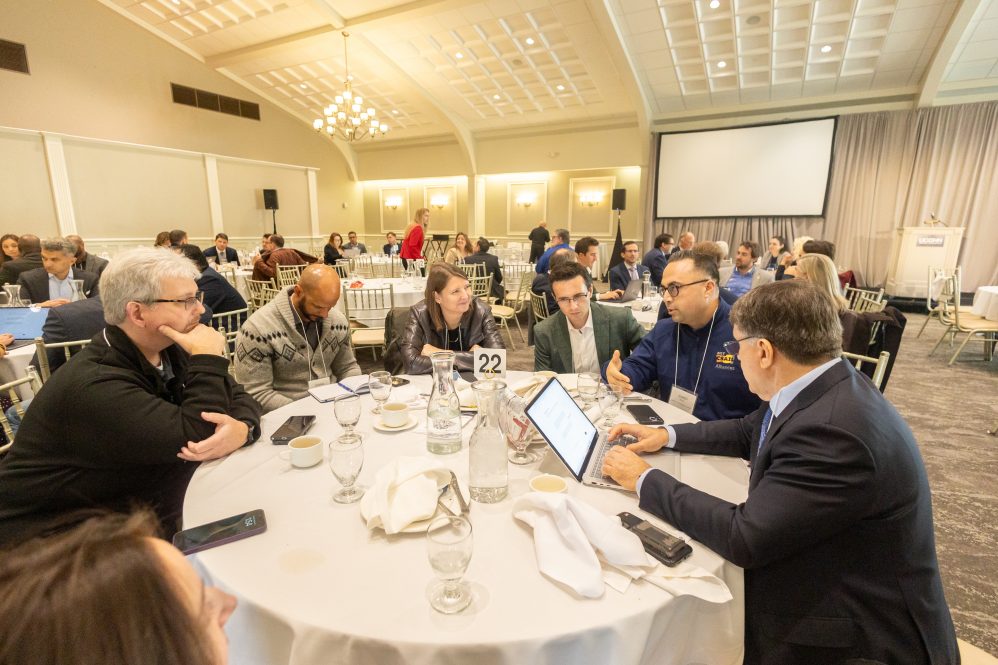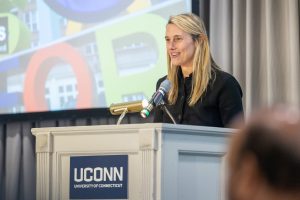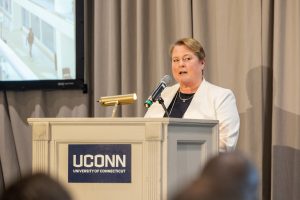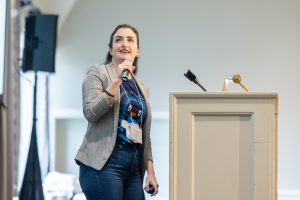Economics Forum in Stamford underscores UConn's role as educator and driver of next generation workforce.

Attendees of UConn's Economic Development Forum use AI tool ThoughtAmp while having interactive discussions at Serafresca at the IC in Stamford on Thursday, Nov. 13, 2025. (Sydney Herdle/UConn Photo)
UConn and its many collaborators throughout the state are leading the effort to educate workers with the skills they need to advance in an evolving economy, especially in the growing areas of artificial intelligence and quantum technology.
State, municipal, University, and tech industry leaders explored the state's changing workforce during UConn's second Economic Development Forum on Nov. 13. Held in Stamford, the event examined how AI and quantum are transforming the workforce, requiring employees and jobseekers to be more tech savvy than ever before.
The AI and quantum industries are skyrocketing, explained UConn President Radenka Maric to hundreds of attendees. Connecticut is well suited to make advancements, with the potential for massive positive impact.

"What are the quantum computers and how they are going to change the world? They will exponentially change the speed that we discover many good things," Maric said. She cited several important Connecticut industries, such as health care and finance, where AI and quantum are making profound progress.
Maric highlighted University's importance to the state, including an $8.7 billion economic impact and wide network of alumni, she said. More than 50% of Connecticut's engineers were educated at UConn.
As AI and quantum grow as industries, the ability to work with major employers will be critical to success. "The keywords for our state are collaboration and partnership," she said. Maric added that Connecticut's small size and proximity to tech hubs like New York City give the state an advantage of places like California, Colorado, Illinois, where large quantum and AI investments are also underway, but geography is not conducive to connectivity.
Rapid Growth in Stamford
UConn's Stamford campus is the second largest in the state behind Storrs, with more than 3,000 students enrolled. The city is the state's fastest growing tech sectors, with digital media, finance, and others providing thriving opportunities for internships and postgraduate employment.
"Companies in Stamford provide students with real world experiences as they pursue their education, as well as job opportunities once they graduate," said Mayor Caroline Simmons. "We want to continue to expand workforce development partnerships and job trading initiatives between UConn and businesses and our region, so that we can create ladders of economic opportunity for our students."
Simmons said the city projects that nine out of 10 local jobs will require workers with advanced technical skills. It's a pivotal moment and another "industrial revolution," she continued, with tremendous opportunity for Stamford and Connecticut.
"We've lived through three great industrial revolutions, mechanization, electrical, and the Internet. Each changed the way we worked, built, and connected with one another," Simmons said. "But the fourth Industrial Revolution, the one we are in right now, is different. It's driven not by invention, but by a fusion of technologies, like artificial intelligence, quantum computing, biotechnology, and robotics."

UConn Stamford Dean and Chief Administrative Officer Jennifer Orlikoff said that the campus offers excellent partnerships with Stamford companies and has become part of the community, with more than 800 students living in UConn housing and a large increase in applications and enrollment.
"We are truly becoming a destination campus," Orlikoff said.
Guidance from Big Tech
The forum included keynote addresses from executives at Google and Indeed, who offered insights on AI and quantum utilization as well as hiring and skillset trends.
"I really feel like I'm here with my people when I listen to the type of innovation and the type of lean-in that we're looking for," said Google Director of Customer Engineering Christopher Mende.
Customer engineering focuses on needs of users and intents and then building the technology to help. AI platforms, such as Google's Gemini, are designed with these principles in mind, and Mende encouraged attendees to grasp those tools.
"That platform is about bringing together those models, those individual shiny objects and neat things which have value on their own and connecting them with the right data sets and applications to allow you to manage them in a very cohesive manner to build effective solutions," Mende said.
Indeed has emerged as the country's largest job searching websites. Product director Elizabeth Lattanzio shared emerging trends among hirers, with skills in AI and quantum at the top of the list. She likened the importance of AI literacy to Microsoft Excel skills 20 years ago, especially in most tech fields.

Lattanzio reassured the audience that AI is not usurping employment opportunities from workers, especially in fields like nursing that require human interaction and soft skills.
"Here's the headline and the thing that I want everybody to kind of take away from here," Lattanzio said. "AI is not going to replace your jobs. At least not yet, or at least for the foreseeable future."
Lattanzio agreed that Connecticut has advantages in the AI workforce, referencing a highly educated populace and existing influence in regulated fields like healthcare and aerospace.
"There's already a big push for talent ecosystem, for AI, through various programs, which is really exciting to see," Lattanzio said. "When it comes to it, Connecticut is way ahead of the curve on pushing towards this AI growth for the state, which is really exciting to see."






